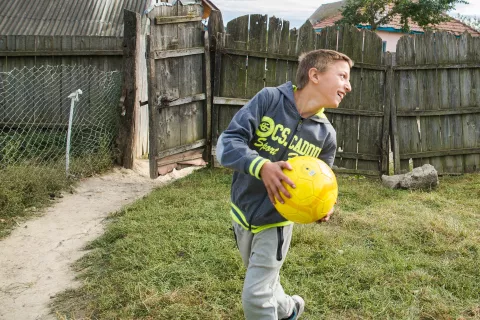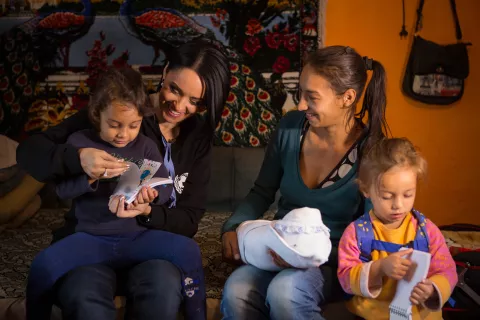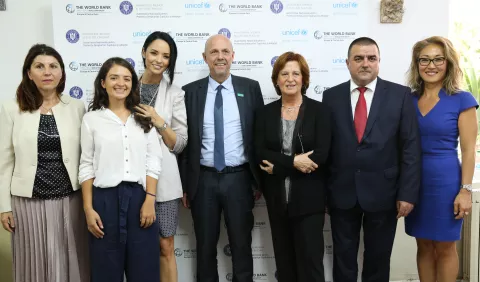When I grow up, I want to be like my teacher
In the village of Orbic, prep school teacher Alina Mănăilă is part mentor, part mom. Smiley visits for support. And play.

- Available in:
- English
- Română
"What do you want to be when you grow up?" "Miss!", say the children all together, looking at their teacher who is also a mentor and sometimes even a mother to the 14 kids in the preparatory class of Orbic school located in the town of Buhuși. Hearing these words, maternal joy lights up the woman’s face, revealing both pride and kindness.
"And we love her very much!", says a little girl with determination. "You’d better…", replies the teacher and her voice is full of emotion. "Show me just how much you love me!" The kids jump up from their chairs and find their way running into the welcoming arms of the woman who goes down on bended knee in the middle of the classroom trying to embrace all of them. "The minute of love" inside the "Bees Classroom" consists of whoops, laughter and long hugs.
"As long as I am at school, I am their mother, especially because many children can’t enjoy their parents’ presence at home, as they are at work, abroad. Children know that whenever they feel like it, we can hug".
Alina Mănăilă, a 33-year-old woman, left her hometown, Bacău, five years ago to be with her husband in Buhuși and build a life. Here, teaching pupils in the preparatory class in Orbic suburb means that day by day she has to bear a hand to their future.
The special bond between the teacher and her pupils is so easy to see! Children listen to her instructions carefully, comply with all her requests, babble whatever she says and fill in the gaps whenever she slows her rhythm and spells out words so the children can answer. No matter the situation, the woman speaks calmly, petting and correcting them with kindness and allowing them to manifest naturally: "This is how children are, this is how I am, this is what we do: we play and learn".
Striving to have a positive contribution in her pupils’ lives, alongside further training in her field, Alina Mănăilă attended parenting education training provided by UNICEF in Romania. These courses are part of the "Quality Inclusive Education" package implemented in 45 educational institutions, including kindergartens, in Bacău County. Based on the knowledge she acquired there, she organized the first parenting education course in the school, consisting of a series of eight informal meetings with the parents; during these sessions, they talked about the importance of their children’s education in a community where the rate of school dropout is high due to poverty. "I think I intrigued them", says the teacher. "At the beginning, they were rather skeptical, but along the way, they started sharing thoughts, ideas and situations they were confronted with and we managed to find solutions together. Thus, we laid the foundations of a supporting group called “Resourceful Parents”. During these meetings, but mostly after, I noticed that the number of children attending school had increased and that their parents were more actively engaged in school activities”.
The teacher knows the situation of her children inside out. When necessary, Alina Mănăilă visits her pupils at home and keeps in close contact with their parents and grandparents. She knows the capabilities of every child in her class and guides each and every one of them with patience towards intellectual and emotional development. For example, the teacher knows too well that Bianca, the most daring girl in the classroom, has been raised by her grandparents from an early age; this is why she became more independent compared to the other children and, as a result, she takes the lead in games and lessons. "She is very bright and she is the only one in the class who knows how to write", says the teacher with delight. "We call her kindergarten cop, because she knows everything that’s going on in the Roma community she lives in”.
Here, we probably work more than one would in other schools; that’s because our children come from single-parent families, poor families or families with many children, so in terms of homework they don’t have any support at home.
"The family's involvement in their children's education is limited to sending them to school and providing them with clothing, that’s it. Being illiterate, the parents or grandparents can’t help the children with their homework, and I’m happy about this, because it means that they have to manage by themselves. So, I am motivated by their needs and I want my classes to be as inspiring and attractive as possible for them. Every day, after school hours, I prepare myself for the next day, searching online for things that might interest them. And every day, I conclude with a story whose ending they will learn only if they join the class the next day", explains the teacher.

In "Bees Classroom" there’s a constant buzz. Children surround Smiley, UNICEF National Ambassador in Romania, and look at his drawing with a grain of salt and amusement. It’s not an easy thing to draw a potato with a cotton swab... "What do we do if Smiley is not doing so well in drawing?", asks the teacher. "We help him!", answer the kids. Smiley’s visit in Buhuși came out of his desire to see the results of the services provided to vulnerable children and their families in order to prevent school non-enrolment, absenteeism and premature dropout.
The objective of UNICEF’s "Inclusive Quality Education" package is to help children from vulnerable backgrounds to enroll in kindergarten and school as early as possible, to support them in learning at their maximum potential so that they can succeed on the labor market and in life. All children have access to this package, but it especially targets children in vulnerable situations (poor children, children born in Roma communities, children living in the countryside or children with disabilities). The children’s parents also benefit from the services in this package. Until now, more than 22,000 children received Quality Inclusive Education, 1,400 teaching staff improved their teaching competencies, and 1,000 parents learned how to better look after their children and support their education.
This pilot model is financially supported by Norway Grants, Foundation Botnar, UNICEF and the private sector.
The model is independently evaluated, and the results are shared with decision-makers to develop new legislation, norms and standards and to mobilize state and European funding for scaling up throughout the country for all children living in Romania.





